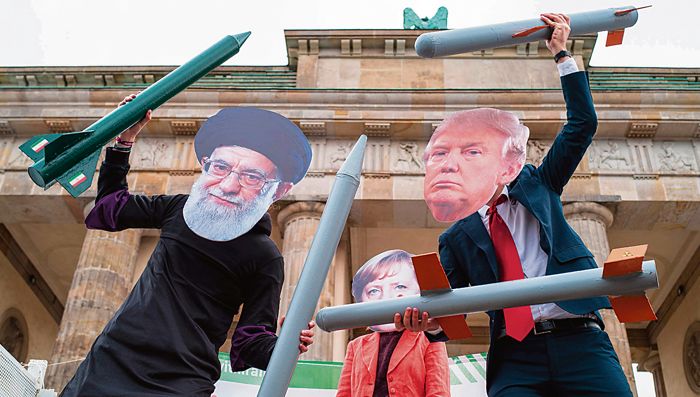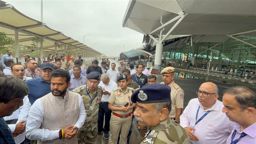
Niraj Srivastava
Niraj Srivastava
Former Ambassador
The killing of Iranian General Qassem Soleimani and his associates by a US drone attack in Baghdad on January 3 is likely to have long-term consequences for America’s role in the Persian Gulf and its relations with Iran. Though the crisis caused by Soleimani’s murder appears to have been contained for the time being, tensions remain high. The atmosphere needs just one more spark to plunge the region into a devastating war, which will adversely affect India’s interests.
The US justified Soleimani's murder on the ground that he was plotting ‘imminent attacks’ against American targets in the region. Speaking at the Hoover Institution on January 13, US Secretary of State Mike Pompeo termed the Soleimani murder as ‘restoration of deterrence’. However, neither he nor President Trump provided any evidence to support their allegation. By killing Soleimani, Trump thought that he could win control of Iraq and achieve regime change in Iran. Both these objectives are unlikely to be achieved.
Iran reacted to Soleimani’s killing with anger, but maturity. Its Foreign Minister tweeted that the “End of US’s malign presence in West Asia had begun.” It launched ballistic missiles against two American bases in Iraq, though reportedly after the Americans had been notified one hour in advance through the Swiss embassy in Tehran. As a result, no US nationals were killed, though some installations were destroyed. That enabled President Trump to announce that de-escalation had taken place, at least for the time being.
The Iranians used their ballistic missiles to send certain messages to the Americans. They launched 17 Qaim-2 missiles to target the Ain al-Assad base, and five Fateh 313 missiles to Erbil airport. The first message was that Iran could hit US targets in the region with precision. The second was that US air defences could not intercept Iranian missiles.
Together, these messages sent a signal of deterrence to the Americans, discouraging them from further adventurism. Moreover, there are indications that Iran’s response to Soleimani's assassination is not yet over. It will strike against US targets at a time and place of its choosing, with plausible deniability. According to one report, it has developed 13 blueprints for attacking American targets.
Soleimani’s killing had several unintended consequences, as often happens in such cases. The most important was a vote in the Iraqi Parliament on January 5, calling for the withdrawal of US forces (numbering around 5,300) from Iraq. Iraqi Prime Minister Adel Abdul Mahdi phoned Mike Pompeo to request him to begin the process for doing so, but was rebuffed. Reacting to the Iraqi PM's request, President Trump asked Iraq to pay billions of dollars that the US had spent in constructing the military bases in Iraq, in complete violation of the agreement signed by the two countries. The agreement acknowledged Iraqi ownership of the bases and recognised “the sovereign right of the government of Iraq to request the departure of the US forces at any time.” Trump even threatened to impose stiff sanctions against Iraq, including closing its account in the Federal Reserve Bank of New York, which contains $35 billion. That was enough to unsettle Iraqi markets.
It has also come to light that in September 2019, the US had demanded that Iraq pay for the completion of key infrastructure projects destroyed by the war against ISIS by giving it 50 per cent of Iraqi oil revenues. The Iraqi PM refused the US offer. Instead, he paid a visit to China during which he signed several agreements for rebuilding Iraq’s infrastructure and developing its oilfields. A furious Trump threatened Abdul Mahdi with large-scale demonstrations in Iraq unless he cancelled the agreements with China. Mahdi refused to do so. By coincidence or not, several demonstrations against the government did take place in October 2019 in Baghdad.
Another fallout of Soleimani’s murder has been the growing solidarity amongst the various Shia groups in Iraq in favour of Iran, and against the US. The influential Shia cleric Moqtada al-Sadr has reactivated his ‘Mahdi Army’, and called for US expulsion from Iraq. On January 24, Sadr called for a ‘million-strong’ protest against American military presence in Iraq. US military facilities will not be easy to defend against popular Iraqi agitation; American deaths are possible and will lead to retaliation against the Iraqis, which will trigger more attacks.
Meanwhile, since the unilateral abrogation of the Iran nuclear deal (also known as the JCPOA) by the US in May 2018, Iran has been increasing, in a calibrated manner, both the enrichment level and the quantity of the uranium produced by it. Much to its disappointment, the E-3 members of the JCPOA-Britain, France, and Germany-have been unable to provide any relief to Iran to mitigate the hardships caused by the US sanctions imposed against it. The INSTEX system of payments promised by them has failed to work.
In this bleak scenario, the E-3, under US pressure, triggered the dispute settlement mechanism of the JCPOA on January 14. After it runs out in about 65 days, the UN sanctions against Iran, so far suspended because of the JCPOA, will automatically ‘snapback’, making life even more difficult for the Iranians. Iran’s Foreign Minister Zarif has said that Iran might leave the nuclear Non-Proliferation Treaty (NPT) itself if the EU-3 refers the issue to the UN Security Council. If that happens, the US and Israel might find an excuse to bomb Iran's nuclear facilities — something Israel has been long calling for.
It is thus evident that General Soleimani's murder by the US has further destabilised an already unstable situation in the Gulf. Among other things, it has ruined US relations with Iraq, which may find it difficult to prevent expulsion of American troops deployed on its soil. That might involve considerable bloodshed because the US will not leave Iraq easily. India will have to work hard to safeguard its interests in the region, home to almost 8 million of its citizens, who live and work there.
Join Whatsapp Channel of The Tribune for latest updates.




























